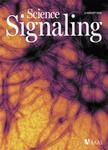版权所有:内蒙古大学图书馆 技术提供:维普资讯• 智图
内蒙古自治区呼和浩特市赛罕区大学西街235号 邮编: 010021

作者机构:Mem Sloan Kettering Canc Ctr Canc Biol & Genet Program New York NY 10065 USA Mem Sloan Kettering Canc Ctr Gerstner Sloan Kettering Grad Sch Biomed Sci New York NY 10065 USA Weill Cornell Med Coll Triinst MD PhD Program New York NY 10065 USA Univ North Carolina Chapel Hill Chapel Hill NC 27514 USA Weill Cornell Med Coll Dept Med Div Gen Internal Med New York NY 10065 USA Univ Chicago Chicago IL 60637 USA Univ Michigan Ann Arbor MI 48109 USA Broad Inst MIT & Harvard Univ Cambridge MA 02142 USA Columbia Univ Vagelos Coll Phys & Surgeons New York NY 10032 USA
出 版 物:《SCIENCE SIGNALING》 (Sci. Signal.)
年 卷 期:2020年第13卷第629期
页 面:eaau1453页
核心收录:
学科分类:0710[理学-生物学] 12[管理学] 1201[管理学-管理科学与工程(可授管理学、工学学位)]
基 金:Ruth L. Kirschstein Predoctoral Individual (F31) National Research Service Award [5F31CA200341-03] Ruth L. Kirschstein M.D./Ph.D. Predoctoral Individual (F30) National Research Service Award [F30CA220954] Medical Scientist Training Program Grant [T32GM007739] NIH Director's New Innovator Award [DP2CA186572] Mentored Clinical Scientist Research Career Development Award [K08AR055368] Melanoma Research Alliance Pershing Square Sohn Foundation Alan and Sandra Gerry Metastasis Research Initiative at the Memorial Sloan Kettering Cancer Center Harry J. Lloyd Foundation and Consano
摘 要:The DNA polymerase Pol kappa plays a key role in translesion synthesis, an error-prone replication mechanism. Pol kappa is overexpressed in various tumor types. Here, we found that melanoma and lung and breast cancer cells experiencing stress from oncogene inhibition up-regulated the expression of Pol kappa and shifted its localization from the cytoplasm to the nucleus. This effect was phenocopied by inhibition of the kinase mTOR, by induction of ER stress, or by glucose deprivation. In unstressed cells, Pol kappa is continually transported out of the nucleus by exportin-1. Inhibiting exportin-1 or overexpressing Pol kappa increased the abundance of nuclear-localized Pol kappa, particularly in response to the BRAF(V600E)-targeted inhibitor vemurafenib, which decreased the cytotoxicity of the drug in BRAF(V600E) melanoma cells. These observations were analogous to how Escherichia coil encountering cell stress and nutrient deprivation can up-regulate and activate DinB/pol IV, the bacterial ortholog of Pol kappa, to induce mutagenesis that enables stress tolerance or escape. However, we found that the increased expression of Pol kappa was not excessively mutagenic, indicating that noncatalytic or other functions of Pol kappa could mediate its role in stress responses in mammalian cells. Repressing the expression or nuclear localization of Pol kappa might prevent drug resistance in some cancer cells.